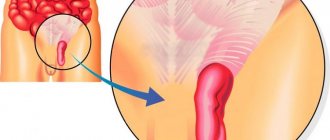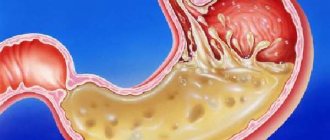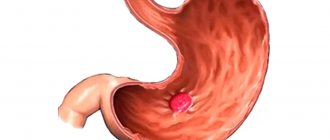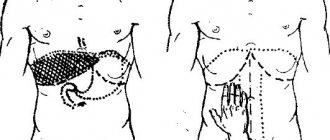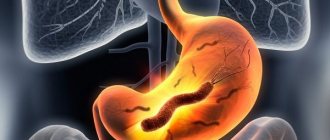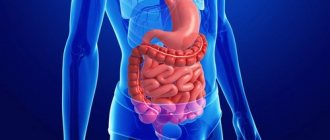Chronic gastritis is a collective concept that includes inflammatory diseases of the stomach, accompanied by changes in the structure of the mucous membrane, progressive atrophy of the gastric glands, impaired secretory function and gastric motility.
There are the following forms of gastritis:
- superficial (catarrhal) gastritis;
- erosive gastritis;
- atrophic gastritis;
- hyperplastic gastritis;
- erythematous (erosive-hemorrhagic) gastritis.
Depending on the activity of the inflammatory reaction, phases are distinguished:
- remission;
- unstable remission;
- exacerbations.
When the activity of the inflammatory reaction increases, the severity of clinical manifestations also increases. Drugs in the acute stage of chronic gastritis are prescribed for the purpose of:
- Impacts on the mucosa in order to minimize anatomical changes caused by the pathological process.
- Elimination of the main clinical manifestations of the disease by normalizing gastric secretion and motility.
- Elimination of extragastric disorders caused by the disease (anemia, dysfunction of the intestines, gall bladder, pancreas, liver).
- Preventing the development of complications and dangerous consequences.
Table of contents
- How does exacerbation of gastritis manifest? Symptoms of exacerbation of gastritis with high acidity
- Symptoms of exacerbation of gastritis with decreased secretory function
- Spring
- What can you eat
Symptoms
Gastritis, exacerbation (symptoms of the disease are expressed in acute and burning pain in the stomach) which is possible only under the influence of negative factors, is characterized by the following clinical picture of the course.
Local
Symptoms of local manifestations are associated with the appearance of painful signs that are localized exclusively in the area of the stomach, namely:
- sharp or burning pain in the upper abdomen;
- spasm of the stomach walls;
- burning sensation;
- acidic taste in the mouth;
- heaviness in the stomach;
- cutting pain in the right hypochondrium;
- complete or partial loss of appetite;
- feeling of false fullness in the stomach;
- flatulence.
Local manifestations of the disease are determined by a general practitioner or gastroenterologist who examines the patient. The presence of these symptoms is a reason to conduct a comprehensive diagnosis of the digestive system.
Are common
Gastritis, exacerbation (symptoms of the disease can be expressed in dysfunction of other organs and systems) which is accompanied by disruption of the stomach, entails the occurrence of the following general signs of the disease:
- physical weakness;
- fast fatiguability;
- pale skin;
- decreased ability to work;
- vomiting stomach acid;
- persistent nausea;
- increased sweating;
- irritability;
- constipation or diarrhea;
- periodic increased heart rate;
- anemia and other disorders of the cellular composition of the blood.
The addition of general symptoms of exacerbation of gastritis indicates that the disease continues to progress, and inflammation of the gastric mucosa covers more and more areas.
Dumping syndrome
The clinical picture of dumping syndrome is accompanied by a sudden feeling of weakness and loss of strength, which appears after 15-20 minutes. after eating food.
The attack begins with the person feeling fullness in the stomach, and then there is a feeling of intense heat spreading throughout the entire upper body. Sweating increases, noises appear in the ears, drowsiness and dizziness occur, and loss of consciousness is possible.
Gastritis with high acidity
Gastritis, exacerbation (symptoms of the disease are accompanied by a rich clinical picture) of which are associated with the influence of negative factors, can develop due to an increase in the concentration of acid in the gastric juice.
In this case, the following signs of pathology are possible:
- nausea;
- vomiting acidic stomach juice;
- loss of appetite;
- burning pain in the epigastrium;
- heartburn;
- sour taste;
- diarrhea;
- belching with the reflux of acidic stomach contents into the esophagus and oral cavity.
Gastritis, accompanied by high acidity, is dangerous because it can provoke erosion of the gastric mucosa and become a prerequisite for the development of ulcers.
Gastritis with decreased acidity
A decrease in acidity levels, combined with inflammation of the gastric mucosa, is expressed in the following symptoms:
- decreased appetite;
- flatulence;
- constipation;
- prolonged digestion of food;
- feeling of heaviness in the stomach;
- spasmodic and cutting pain;
- nausea.
A simultaneous decrease in acidity levels and inflammation of the gastric mucosa is characteristic of exacerbation of atrophic type gastritis. Such symptoms indicate a loss of functionality of the digestive organ and the replacement of its secretory glands with fibrous tissue.
How does exacerbation of gastritis manifest?
If an exacerbation of chronic gastritis occurs, the symptoms of the pathology are expressed by the following syndromes:
- Gastric dyspepsia (manifested by: heaviness in the abdomen, nausea, belching, vomiting).
- Stomach pain is mostly moderate.
- Intestinal dyspepsia (flatulence, stool disturbance, rumbling in the abdomen).
- Asthenoneurotic syndrome (irritability, often cancerophobia, poor sleep, fatigue).
Depending on the pH of gastric juice, the severity of individual syndromes manifests itself differently.
Symptoms of exacerbation of gastritis with high acidity
Gastritis with high acidity in the acute stage manifests itself:
- Moderately severe abdominal pain, sometimes the pain syndrome is manifested by a feeling of heaviness and discomfort.
- Dyspepsia: belching, nausea, unpleasant taste in the mouth.
- Neurasthenic syndrome (often expressed during exacerbation of hyperacid gastritis).
Treatment is aimed at preventing the progression of the disease and relieving symptoms of exacerbation:
- eradication of Helicobacter pylori infection according to one of the recommended regimens;
- drugs that normalize the pH of gastric juice (PPIs, IGRs, antacids);
- drugs that normalize gastric motility (prokinetics);
- sedative therapy.
What does gastric juice contain?
Symptoms of exacerbation of gastritis with decreased secretory function
Gastritis with low acidity during an exacerbation is characterized by the following symptoms:
- Discomfort and heaviness in the abdomen, sometimes moderate pain;
- Gastric dyspeptic symptoms - loss of appetite, nausea, belching, and occasionally vomiting.
- Intestinal dyspeptic manifestations: patients complain of diarrhea, rumbling in the stomach, flatulence.
- Impaired digestion of food, which leads to hypovitaminosis (hair loss, peeling skin) and anemia (weakness, dizziness).
The direction of drug therapy is determined by disturbances in the morphology and function of the gastric mucosa during an exacerbation:
- For atrophic gastritis associated with Helicobacter pylori infection, antibacterial therapy is used.
- Impact on the affected mucosa - drugs that enhance regeneration processes and improve regional blood circulation.
- Medicines that enhance weakened gastric secretion.
- Drugs that enhance gastric motility.
- Enzymatic group of drugs (Creon, Wobenzym).
Signs of exacerbation of chronic gastritis
The symptoms of exacerbation of gastritis are generally very similar in the clinical picture of their manifestation. There are only minor differences associated with the localization of the pathological process.
Antral gastritis
The initial stage of development of antral gastritis is not manifested by signs of an atrophic process in the gastric mucosa. The secretory function of the stomach is preserved and is within normal limits. The clinical manifestations of the disease resemble the symptoms of ulcer formation.
The following signs of the disease are present:
- sour belching;
- heartburn;
- bad breath;
- constipation;
- belching air;
- feeling of acute pain on an empty stomach.
Some time after eating, the pain subsides. At the same time, the appetite is completely preserved and in general the patient eats well without long time intervals between meals.
Erosive gastritis
One of the most dangerous types of inflammation of the gastric mucosa, which is manifested by the following symptoms:
- large areas of spread of the inflammatory process of the mucous membrane;
- thinning of the inner epithelial layer of the stomach;
- the appearance of acute spasmodic pain;
- complete or partial loss of appetite.
Exacerbation of erosive gastritis is a pre-ulcerative condition of the digestive organ. Without timely and effective treatment, multiple erosions appear on the gastric mucosa, which quickly increase in size.
Atrophic gastritis
In most cases, the disease is characterized by a chronic form.
During periods of exacerbation of atrophic gastritis, the patient experiences the following symptoms:
- sudden weakness that occurs immediately after eating;
- feeling of nausea;
- pale skin;
- heaviness and spasms, acute pain in the area of the stomach;
- disruption of the digestive process;
- sudden urge to stool, which in most cases is liquid, but there are no signs of poisoning.
Atrophic gastritis is characterized by a decrease in the digestive function of the stomach, and exacerbation of the disease only intensifies these symptoms.
Autoimmune gastritis
In medical terminology, autoimmune gastritis is referred to as type A or fundic.
The course of the disease is accompanied by the following symptoms:
- acute cramping pain in the upper abdominal cavity;
- complete or partial loss of appetite;
- unpleasant taste in the mouth;
- acid belching;
- bowel dysfunction, which is accompanied by constipation or periodic diarrhea.
A distinctive feature of exacerbation of autoimmune gastritis is that the patient’s immune system attacks the lining cells of the inner layer of the stomach. This leads to an exacerbation of the sluggish inflammatory process.
Reflux gastritis
Signs of exacerbation of chronic reflux gastritis are expressed in the following pathological state of the digestive system:
- nausea;
- secretion of vomit, the predominant composition of which is gastric juice;
- acute pain in the epigastrium or right hypochondrium;
- flatulence;
- after eating even a small amount of food, there is a feeling of heaviness and fullness in the stomach;
- the food consumed is not fully digested;
- the stool is mostly liquid and contains fragments of undigested food.
During the period of exacerbation of reflux gastritis, patients become more irritable and hot-tempered. Insomnia, anemia and pale skin may occur.
When are flare-up symptoms likely to occur?
The clinical picture of exacerbation of chronic gastritis is not always clear-cut. Signs of exacerbation of gastritis can be expressed in a slight increase in the symptoms familiar to the patient:
- The feeling of discomfort in the stomach is periodically replaced by pain of varying severity;
- Lack of appetite, belching, nausea, heartburn, vomiting become more frequent;
- Signs of intestinal dyspepsia (flatulence, stool instability) become almost constant.
- Weakness, decreased performance, irritability, and insomnia appear.
- Sometimes the temperature rises.
The causes of symptoms of exacerbation of gastritis can be external (diet violation, alcohol intake, stress) and internal (exacerbation of kidney, liver, heart and vascular diseases).
The literature often indicates a seasonal exacerbation of the disease - in spring and autumn. However, it must be said that over the last 15-20 years, clinicians have not noted a strict correlation between the season of the year and the increase in exacerbations of chronic gastritis.
Exacerbation of gastritis in spring
It is believed that the spring exacerbation of gastritis occurs in the period March-May.
The main causes of exacerbation are the following:
- Spring is the time when the first edible greens appear (onions, sorrel, radishes), which are eaten raw and in excessive quantities, which is unacceptable for gastritis.
- In the spring, tomatoes and cucumbers appear on the shelves very early; for such early ripening, nitrates and nitrites are used, which causes an aggravation.
- Another reason for exacerbation of chronic hepatitis can be “old” vegetables and fruits prepared in the fall. Which by spring have become rougher; in addition, during the winter period, harmful substances accumulate in them, leading to the activation of chronic inflammation.
At the first signs of exacerbation, you should consult a doctor who will adjust your diet and prescribe treatment. You should not take medications on your own, even those that helped before, as this can lead to a worsening of the condition.
How to drink potato juice for gastritis
Exacerbation of gastritis in autumn
The causes of autumn exacerbation of gastritis include:
- Colds that become more frequent with cold weather lead to a depletion of the body's defenses and, as a result, an exacerbation of chronic diseases, including gastritis.
- Taking many medications against colds, often purely preventative, cannot but affect the condition of the gastric mucosa.
- Emotional depression, which is associated with decreased daylight hours and cloudy rainy weather. Some authors describe this as autumn stress, which also affects the possibility of exacerbation of gastritis.
The treatment of an exacerbation that occurs in the fall does not have any special features compared to the general principles. The patient is prescribed a diet. Medicines are prescribed based on the etiology, form and degree of exacerbation of the disease.
Causes of exacerbation of gastritis in adults
Symptoms of exacerbation of gastritis appear suddenly, and a prerequisite for their occurrence is one-time or prolonged exposure to negative factors that irritate the gastric mucosa. The following are the most common causes of exacerbation of gastritis.
Seasonal
Exacerbation of gastritis most often occurs during the off-season. This is mainly autumn and spring, when there is a sharp change in air temperature, cooling begins, rains or high air humidity predominate, and the quality and diet also changes. The body's protective functions become weaker, which leads to a seasonal exacerbation of inflammatory processes in the gastric mucosa.
Nervous
Against the background of strong psycho-emotional arousal or nervous stress, intestinal motility accelerates, and an involuntary spasm of the muscles responsible for contraction of the stomach occurs.
A healthy person does not feel any discomfort in the digestive tract, but in a patient with gastritis this leads to exacerbation of inflammation of the gastric mucosa. With prolonged stress and nervous tension, the symptoms of the disease only worsen.
After antibiotics
A course of antibacterial therapy disrupts the balance of beneficial and pathogenic microorganisms present in the human digestive system. Active and auxiliary substances contained in tablets, medicinal solutions and suspensions irritate the gastric mucosa, causing an even more acute inflammatory process.
Before your period
2-3 days before the start of menstruation and the same amount of time after menstruation, a short-term imbalance of sex hormones occurs in a woman’s body. This negatively affects the functioning of the entire digestive system.
Women who have chronic stomach disease may experience exacerbation of the disease and symptoms of inflammation of the gastric mucosa. This cause of exacerbation of the disease is the least common in medical practice.
During pregnancy
During pregnancy, a woman's body is subjected to enormous physical and metabolic stress. Against the background of a temporary metabolic disorder, hormonal imbalance or toxicosis, a temporary exacerbation of chronic diseases, including gastritis, is possible.
After a binge
Gastritis, an exacerbation (symptoms of the disease arise sharply and are manifested by sudden spasmodic pain), which is caused by the consequences of prolonged consumption of alcoholic beverages, may be accompanied by attacks of severe vomiting and complete refusal of food.
Can there be a temperature during exacerbation of gastritis?
Chronic gastritis is an inflammatory disease, so the temperature may rise during exacerbation of gastritis. It should be remembered here that even a slight rise in temperature indicates severe inflammation in the mucous membrane.
Symptoms corresponding to this exacerbation:
- anorexia – refusal to eat;
- quite severe abdominal pain, often of a bursting nature;
- nausea, vomiting, bringing short-term relief;
- Vomiting with dark vomit requires special attention, which indicates bleeding;
- flatulence, diarrhea followed by constipation.
Gastritis has worsened: what to do at home
If severe pain appears in the epigastric region, associated with gastritis, the patient needs to take an antispasmodic ( no-spa ), as well as smecta or activated charcoal . After this, lie on your side (fetal position). Apply a cool heating pad to the epigastric area. If the pain does not subside, you need to drink a warm decoction of rice grains. It has an enveloping effect, creating a protective film on the stomach wall that prevents the harmful effects of hydrochloric acid on the mucous membrane.
For frequently recurring pain, you can use a folk remedy - drink soda solution . It will relieve the symptoms of pain, but this is a short-term effect. In addition, this solution should not be drunk frequently, as it harms the gastric mucosa. Soda, when combined with hydrochloric acid, releases carbon dioxide, which has an irritating effect on the stomach wall. Therefore, this method should be used extremely rarely. It is better to consult a doctor to prescribe antacid medications.
There are traditional ways to relieve pain during attacks. But it should be remembered that people who are prone to allergies, as well as those with individual intolerance to certain products, should use recipes with caution.
- Heat half a glass of milk , adding a teaspoon of honey. Drink in small sips. The intensity of pain decreases after just a few minutes after administration. The drink can be drunk daily in the morning to prevent relapse.
- Using an infusion of currant leaves helps relieve pain. The medicine is used as a hemostatic, bactericidal, anti-inflammatory agent. To prepare the infusion, pour 500 ml of boiling water and 2 tablespoons of dry crushed leaves. Seal the container (it is better to do it in a thermos), wrap it up and let it stand for 2-3 hours. You need to drink in two doses half an hour before meals.
- If the patient is allergic to bee products, then honey is replaced with medicinal chamomile . Pour boiling milk (1 glass) over a dessert spoon of the plant and leave for 25 minutes. Take a glass during an attack. For prevention, drink half a glass in the morning before meals.
- Quickly relieves pain with a fresh aloe leaf , which you need to chew and eat, after peeling it off. the pain subsides after 20 minutes. But you cannot often resort to this method.
- A decoction of lemon and rosehip , as well as sauerkraut juice mixed with plantain decoction.
- Drinking a glass of mineral water (“ Borjomi ”, “ Essentuki ”) alleviates the patient’s condition.
Even if the attack has passed, you need to inform your doctor about this and get recommendations from him regarding further treatment.
How long does an exacerbation of gastritis last?
How long an exacerbation of chronic gastritis lasts depends on the form of the disease, the severity of the inflammatory process, and the cause that caused the exacerbation.
This usually takes about 30 days, provided proper treatment and diet are followed (sick leave is issued for the entire period). Here you need to know that some symptoms (nausea, heartburn, pain) may disappear immediately after starting to take the drugs, but this does not mean that the exacerbation has passed. If the patient stops treatment at this stage, the only thing he will achieve is a relapse of the disease after a short period of time with pain, nausea, belching, and vomiting. Recovery will have to wait indefinitely.
Useful video
Important doctor's advice is given in this video.
Bee products
Propolis is known for its healing properties and gives the desired effect in the treatment of gastritis. For therapy, an aqueous tincture of the product is used. Prepare the mixture by steaming, after crushing the propolis and filling it with water. To make it easier to grate the product, place it in the freezer for half an hour. The prepared tincture is stored for a week, and then a new one is made. You need to drink half a glass of medicine daily.
Birch bark
To treat chronic gastritis, accompanied by frequent heartburn, use an infusion of birch bark. It is better to collect the bark in early spring, when it is tender and soft. 2 tbsp. l. crushed bark is poured with water and left for 3 hours. The water should be warm (55-65*). You need to drink before meals three times a day. After taking the medicine, take a tablespoon of melted butter 15 minutes later, and after another 15 minutes you can start eating. You need to be treated like this for three weeks.
What to do if gastritis worsens
If there is an exacerbation of gastritis, treatment at home is unacceptable. Relieving an exacerbation of chronic gastritis means not only relieving pain, nausea, heartburn (which folk remedies can easily cope with). It is important to minimize changes in the mucosa caused by inflammation. The main thing is to prevent the progression of the disease and prevent complications, which can only be treated with drug therapy prescribed by a doctor.
At the first signs of exacerbation of gastritis, you should consult with a gastroenterologist and he, after a physical examination and examination, will tell you how to relieve the exacerbation of gastritis in a particular case.
What to eat for gastritis during an exacerbation
In case of exacerbation of most forms of gastritis, the basis of nutrition is table No. 5 according to Pevzner.
The diet helps relieve symptoms of exacerbation by normalizing the digestion process. Not only a list of products is recommended, but also a method of preparing them. Food should only be fresh. Food can be steamed, stewed and boiled.
The patient's menu should include only approved products.
The recommended list of products determines what to eat during exacerbation of gastritis:
- dried wheat bread;
- dietary meat and fish;
- dietary sausages in limited quantities;
- vegetable broth soups;
- porridge with water (rice, buckwheat, oatmeal);
- small pasta;
- low-fat fermented milk products (kefir, cottage cheese, cheese, fermented baked milk, yogurt);
- butter;
- chicken and quail eggs;
- pureed vegetables (potatoes, beets, pumpkin, zucchini, cauliflower);
- vareniki;
- sweet fruits and berries, crushed in a blender, can be eaten in the form of salads - bananas, persimmons, raspberries, apples, grapes, pomegranate;
- apple jam, marmalade, honey, condensed milk, marshmallows and other sweets.
General dietary recommendations in the acute stage of gastritis
It is impossible to miss such a deterioration of the condition. Acute gastritis is a constant pain that cannot be treated with painkillers. Common symptoms include a burning sensation in the upper abdomen, a feeling of fullness, belching and bloating, and loss of appetite and weight.
Often this is accompanied by nausea, and with corrosive gastritis, vomiting. In the chronic form, it may contain inclusions of blood. Since eating is extremely difficult due to pain, the diet for gastritis in the acute stage is quite easy to maintain.
The diet for gastritis in the acute stage involves food restrictions. The most important thing now is to relieve the burden on the gastrointestinal tract as much as possible and create favorable conditions for recovery. Please note that if you put off visiting a doctor, the disease may become chronic.
In this case, any stress will provoke a relapse. It is not without reason that people who are well acquainted with gastritis already know all the nutritional recommendations by heart and, when they feel the first signs of a deterioration in their condition, they immediately adjust their diet.
So, at the acute stage, 2-3 days of a strict diet are usually enough for the condition to significantly improve. For some, this may be a fruit release, but this option is not suitable for everyone. Therefore, consult your doctor first.
At the stage of exacerbation of gastritis, 2-3 days of a strict diet are usually enough for the condition to significantly improve
Most often, experts recommend switching to a liquid diet, which includes light puree soups and low-fat fermented milk products. As the condition improves, the number of allowed dishes will constantly increase.
General rules of diet for exacerbation of gastritis:
- You can only eat light food in small quantities, often and little by little;
- eat simple meals: let only 1-2 foods enter the stomach at a time. Multi-component dishes put too much stress on the gastrointestinal tract;
- the last meal should be 3-4 hours before bedtime;
- It is extremely important to avoid drinking alcohol, and you must also stop smoking. Seasonings and semi-finished products, spicy and sour foods are not your option yet;
- don’t rush: you need to chew each piece as thoroughly as possible;
- Moderate physical activity is not prohibited: running or swimming, yoga - any sport that you like. The weakness experienced by patients with gastritis is often due to a lack of vitamin B12, which is not absorbed during gastritis. Introducing vitamin complexes into the diet will help solve this problem.
The menu for gastritis in the acute stage should completely exclude fatty and fried foods. No pies in butter, chebureks and belyashi, yeast baked goods and soups in rich, fatty broth. You will have to do without fermented milk products (cheese and cottage cheese, sour cream). For all their usefulness, they are very difficult to digest.
Fresh bread and any baked goods should be replaced with crackers. But not packaged from the store, but prepared with your own hands. You should exclude any raw vegetables and fruits, as well as berries. Cocoa, carbonated drinks and spices are prohibited. Of course, you need to give up any alcohol.
What to drink during exacerbation of gastritis
Drinks are one of the components of the diet, so their choice should be taken seriously.
During exacerbation of gastritis, you can drink:
- jelly, compotes from dried fruits and fresh berries and fruits;
- decoction of rosehip, chamomile;
- brewed chicory;
- natural freshly squeezed diluted juices (potato juice, beet juice);
- weak tea with low-fat milk;
- mineral waters (Essentuki, Borjomi);
- green tea without sugar;
- fermented milk products (kefir, yogurt, preferably biokefir, bioyogurt;
- low-fat milk, moderate amount.
You can't drink:
- alcohol;
- instant and brewed coffee;
- store-bought juices;
- cocoa;
- carbonated drinks;
- beer;
- kvass;
- Black tea.
Is it possible to play sports
Sports during exacerbation of gastritis, as well as other types of excessive physical and mental stress, are prohibited.
Sports diets containing large quantities of amino acids are also contraindicated. Only after the disease has entered the stage of stable remission will it be possible to continue training. But this applies to amateur sports. A patient with chronic gastritis is unlikely to be able to engage in professional sports, since increased physical activity is prohibited even without an exacerbation.
Diagnostics
It can be difficult to clinically determine the presence of an exacerbation of chronic hepatitis.
Laboratory studies confirming exacerbation of chronic gastritis:
- general peripheral blood test;
- stool test for blood;
- general coprogram;
- immunological blood test;
- cytological examination of a biopsy taken during endoscopy;
- study of the results of a breath test.
Instrumental research methods:
- FGDS examination of the stomach - makes it possible to examine the inner surface of the stomach and compare data with previous studies, to see the process in dynamics;
- X-ray examination with contrast - allows you to assess the condition of the organ as a whole, determine its motor function, comparing the results with previous images, and analyze the process in dynamics.
- pH measurement of gastric juice;
- thermography makes it possible to judge the activity of the inflammatory reaction.
Exacerbation of gastritis during pregnancy
If a woman suffered from chronic gastritis before pregnancy, then the likelihood that gastritis will worsen during pregnancy is very high.
Causes of exacerbation of gastritis during pregnancy:
- hormonal changes;
- stress;
- toxicosis phenomena;
- the predominance in the diet of foods that irritate the mucous membrane.
The transition of the disease to the active phase does not affect gestation in any way, but for the woman the process of pregnancy will be significantly more complicated. Usually the patient does not immediately understand that she has acute chronic gastritis, since in the early stages of pregnancy its clinical manifestations are similar to the symptoms of toxicosis. The patient is worried about nausea, belching, vomiting, flatulence, and stool instability. All these symptoms are long-lasting, which worsens the general condition of the pregnant woman.
Treatment of gastritis in pregnant women during the period of exacerbation is a complex matter, this is due to the limited list of medications that can be used during pregnancy. After pregnancy and lactation, the patient should be treated in full.
Treatment and prevention
Treatment of gastritis, especially chronic gastritis, is a difficult task that requires endurance and willpower of the patient. The fact is that there is no universal pill, after taking which life will return to normal. One of the main provocateurs of the disease is food, which can renew the disease at any time.
To begin with, as soon as the first symptoms of the disease appear, it is worth reviewing your diet, since treating gastritis must begin with proper nutrition, which is considered the main component of the treatment of the disease. Excluding harmful foods from your usual diet and eating regularly in small portions will immediately provide positive prerequisites for recovery. In case of exacerbation, it is worth following a more strict diet that meets the requirements of doctors. Eating liquid food in pureed form from light foods is the main prescription for acute gastritis.
In addition, pain can be relieved with No-shpa or analgesics, and to improve digestion, doctors can prescribe Festal, Pancreatin, Gastal and other drugs. However, you should not prescribe medications yourself, since not all drugs are suitable for different types of gastritis. Only a gastroenterologist can choose the right treatment based on a complete examination and tests.
And one more important point: treating a disease is always more difficult than preventing it. Since seasonal exacerbations of the disease have specific causes, it is not so difficult to foresee them and eradicate them to the maximum. In order for spring and autumn to pass without the standard intensification of the disease, you should be attentive to your diet throughout your life, and not just during periods of exacerbation, give up bad habits, and try to avoid stressful overexertion. In the spring, it is important not to exhaust yourself with unjustified diets, but to introduce the first vegetables and fruits that are beneficial for the body into the diet little by little and with great care.
In the fall, doctors recommend paying more attention to your daily routine, as well as rational rest, so that weather conditions and climate changes pass as unnoticed as possible for the body. Regular walks on the street, in parks and squares are useful, which can lift your spirits even in the fall and cure the blues, since this time of year also has many of its charms.
Exacerbation of gastritis before menstruation
Exacerbation of gastritis before menstruation is explained by the increased vulnerability of the woman’s body to the action of damaging factors.
The reasons for this may be:
- increased nervousness;
- hormonal imbalance;
- rhythmic contractions of a slightly enlarged uterus, thanks to visceral reflexes, can contribute to impaired gastric motility.
Exacerbation of gastritis during menstruation occurs when the negative influence of factors damaging the mucous membrane begins to prevail over the action of protective mechanisms.
What is the danger of exacerbation of gastritis?
Chronic forms of gastritis are a long-term disease. Exacerbation of gastritis is not only an intensification of the clinical manifestations of the disease, but also the progression of the pathological process. In the acute phase, the likelihood of developing various kinds of complications is especially high. Complications of gastritis are often more dangerous than the disease that caused them.
These include:
- stomach bleeding;
- stomach ulcer;
- phlegmon;
- stomach cancer;
- anemia;
- spread of the disease to neighboring organs (cholecystitis, pancreatitis, enteritis).
Folk remedies
In addition to the use of medication, physiotherapy, and adherence to dietary rules, the following folk recipes are used.
Potato juice
You will need to take 2-3 potatoes, peel them, and then chop them to a smooth paste.
The resulting mass is squeezed out through gauze or a press. Squeezed potato juice is taken 3 times a day, 1 tbsp. l. in 20 minutes before meals. The duration of therapy is at least 1 month.
Carrot juice
It has antiseptic and anti-inflammatory properties. To prepare a homemade medicine, you need to take 5 medium-sized carrots, then chop them and squeeze out the juice. This remedy is taken 1 tbsp. l. 4 times a day for 4-6 weeks for 20 minutes. before the meal.
Elecampane decoction
To relieve exacerbation of gastritis using a decoction of elecampane, you need to take 2 tsp. pour this dried plant into a metal bowl and add 200 ml of running water. Then the future medicine should boil for 10 minutes. After cooling, take 100 ml in the morning and evening. Duration of treatment is 20-30 days.
Plantain infusion
This is an aqueous infusion of plantain leaves. To prepare the medicine you need to take 2 tbsp. l. dried plantain leaves and pour them into a thermos. Then you should pour 0.5 liters of boiling water over the plant and close the lid tightly.
The future plantain-based medicine should be infused for the next 4 hours. After the specified time, the product is ready for use for therapeutic purposes. Take 150 ml 3 times a day for 30 minutes. before meals.
Has anti-inflammatory, antiseptic and regenerative effects. This folk remedy is especially effective for atrophic and erosive gastritis, when the pathological process affects not only the mucous membrane of the digestive organ, but also leads to depletion of epithelial tissues, the formation of small ulcers, and reduces secretory function.
Prevention of exacerbations of gastritis
To avoid exacerbation of the disease, it is necessary to eliminate the main causes that led to the disease:
- Eat on time and regularly at the same time. Portions should be small, the number of meals should be increased (1-2 snacks should be taken between breakfast, lunch and dinner).
- Food should be boiled, stewed, baked. Other methods of cooking are excluded.
- Dishes must be warm.
- Alcohol and smoking should be avoided.
- Avoid excessive mental and physical stress.
- Ensure 8 hours of sleep at night.
- Regularly perform a set of morning exercises and walk.
If a relapse occurs, then before treating an exacerbation of gastritis, it is necessary to visit a gastroenterologist, undergo the necessary examinations and only then begin treatment.
Herbal medicine for gastritis
People suffering from inflammation of the gastric mucosa often turn to traditional healers for help and ask them whether gastritis can be cured. Healers advise using herbal medicine, because Mother Nature has created a huge number of useful plants that can cure various ailments. For gastritis with excessive acidity, a medicine prepared according to the following recipe can help:
- take the herb of celandine, comfrey, marshmallow root and licorice (the first ingredient should be taken in relation to the others in the ratio 1:2:2:2);
- all ingredients are crushed and mixed;
- 1 tbsp. l. pour the prepared mixture into a glass of cold water, put on fire and bring to a boil;
- infuse the medicine for a quarter of an hour;
- filter;
- take 1 glass of infusion three times a day, half an hour before meals (course of treatment – 30 days).
If you have a disease with low acidity, it is recommended to use a different recipe. Effective treatment of gastritis with folk remedies is possible if you strictly follow the instructions:
- 1 tsp. chopped calamus rhizome is poured into a glass of boiling water;
- infuse the medicine for 20 minutes;
- filter;
- take the infusion half an hour before meals, half a glass, four times a day.
So, we have found answers to the questions about whether it is possible to cope with the acute form of the disease, and whether it is possible to cure chronic gastritis forever. To summarize, it is worth noting that the disease develops due to the fact that people often neglect simple rules: they do not eat at the same time, skip meals, eat too cold, hot and spicy, drink alcohol, smoke. If you lead a healthy lifestyle, there will be no problems with the gastrointestinal tract, and gastritis will not occur. Prevention is precisely this.
Many diseases occur with periods of exacerbation and remission. The above fully applies to chronic gastritis. The disease consists of inflammation of the gastric mucosa. The severity and severity of the disease directly depend on the degree of damage to the gastric lining.
Exacerbation of gastritis often occurs in summer and autumn, which is also recognized as a popular holiday period. Patients relax on vacation, forgetting about medical recommendations, and begin to violate their usual diet. For example, consume more vegetables and fruits than usual. Fiber, found in available southern products, often provokes acute gastritis.
Other exacerbation factors:
- smoking and alcohol abuse;
- immune system disorders;
- binge eating;
- diets for weight loss;
- fatigue and nervous overload;
- intestinal infections;
- interseasonal cooling;
- Helicobacter pylori infection;
- other concomitant diseases;
- taking medications with irritating effects.
Gastritis can worsen quickly, sharply or slowly, gradually, with increasing intensity of symptoms.

